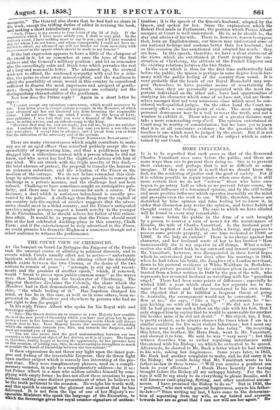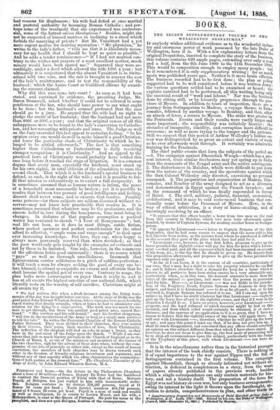HOME INFLUENCES.
IT is to be regretted that such cases as that of the Reverend Charles Yansittart ever come before the public, and there are more ways than one to prevent their doing so. One is to prevent their existence, and perhaps that is not so difficult as some imagine. If they do exist it is well that we should know the fact, for the rendering of justice and the good of society. For if it is seldom possible to repair injuries when once done, it is still more certain that we do not " reform " those who have once begun to go astray half so often as we prevent future errors, by the moral influence of a forearmed opinion, and by the still better and more positive influence which operates insensibly on the mind and prevents even the wish to err. While, therefore, homes are disturbed by false opinion and false feeling let us know it, in order that discussion may revise the opinion, and better habits of thought correct the feeling. The ease to which we have alluded will be found in every way remarkable.
It comes before the public in the form of a suit brought by a person to recover a sum of money for the maintenance of Rosalie, the wife of Charles Yansittart. Is the husband poor ? Ile is the nephew of Lord Bexley, holds a living, and appears to possess some private property, at one time reckoned at 1100/. or 1200/. Is the lady an outcast ? There is no charge against her character, and her husband wrote of her to her brother "How immeasurably she is my superior in all things. What a refor- mation she will effect both in my outward and inward carriage!" Mr. Vansittart, however, was disappointed in these fervid hopes which he entertained just two days after his marriage in 1845, when he had taken his bride, the daughter of a London merchant, down to his pastoral residence at White Waltham in Berkshire. The next picture presented by the evidence given in court is ex- tracted from a letter written in 1849 by the pen of the wife, who represents her reverend husband as wrestling with his "guardian angel." There had been some points of difference ; especially he wished 150/. a year which stood. for her separate use in the name of her father and brother transferred to his own name. She objected that if he fulfilled a frequent threat of going to Australia, the arrangement would not be convenient. "He flew at me," she says, "like a tiger " ; afterwards he "be- gan kicking me with all his might." "He did not leave me till he had given me such a blow on the side with his foot, that I only stopped him by saying that he would be answerable for another life besides mine if he did not desist." " His object, too, I fear, is pretty evident, as be always chooses the times when I am in a similar condition for his most violent behaviour ; but I must say he never went to such lengths as he has today." On receiving this letter, the brother, Mr. Hans Busk, went to Mr. Yansittart, and showed it to him. He said he was " very sorry " ; but this witness describes him as rather repulsing interference until threatened with his Bishop ; on which he entreated to be spared. Afterwards, he showed to Mr. Busk a letter which lie had written to his wife, asking her forgiveness. Some years later, in 1853, Mr. Busk had another complaint to make, and he did carry it to the Bishop ; the result being that Mr. Yansittart wrote to his father-in-law in these tennis—" Will you receive a penitent son back to your affections ? I thank Hans heartily for having brought before the Bishop all my unhappy history. For the fu- ture it will be my study to do everything to please Rosalie, and I will forswear card.-playing, flirting, and other unclerioal amuse- ments. I have promised the Bishop to do so." But in 1856, the "penitent," who met with general forgiveness, says to his father- in-law—" Since writing my last, I have come to the determina- tion of separating from my wife, as my hatred and aversion towards her are so great that I can nor will see her again! He had reasons fol. displeasure : his wife had defied at once marital and pastoral authority by becoming Roman Catholic ; and per- haps some of the treatment that she experienced was controver- sial, some of the hatred odium theologicum ? Besides, might she not be suspected of biassed motives in inclining to a creed which forbids the marrying of priests ? But Mr. Vansittart had a yet more cogent motive for desiring separation : is physician," he writes to the lady's father, "tells me that it s absolutely neces- sary for my health that I should be kept as quiet as possible." And he adds a tender reminiscence—" If I had not married con- trary to the wishes and prayers of a most excellent mother, much misery would have been spared me." Separated they were ac- cordingly, under a deed which allowed the wife 120/. a year ; but ultimately it is conjectured that the absent Vansittart is in Switz- erland with two sons, and the suit is brought to recover the cost -of the lady's maintenance, and to test the responsibility of the husband ; which the Assize Court at Guildford affirms by award- ing the amount claimed.
Why did this case come into court ? As soon as it had been stated, and sustained by evidence, the presiding Judge, Mr. Baron Bramwell, asked whether it could not be referred to some gentleman at the bar, who should have power to say what ought to be done ; but the husband's counsel preferred that the case should go to a jury. He argued that the wife had no right to pledge the credit of her husband ; that the husband had not more than 4001. or 500/. a year ; and that the original causes of all this unhappiness were to be found in the lady's conversion to Catholic- ism, and her consorting with priests and nuns. The Judge as well as the Jury overruled this last appeal to sectarian feeling. "In his opinion every one would do well to make himself a good Christian, and leave the particular shade of Christianity to which he be- longed to be settled afterwards." The fact is that something higher than Catholicism or Protestantism is daily receiving stronger recognition : it is Christianity.* And an appeal to the practical laws of Christianity would probably have settled this ease long before it reached the stage of litigation. It is a common dogma that every man, especially the husband, must stand up for his own rights, in total oblivion, of the admonition to turn the second cheek. That which it is the husband's special business to defend, as such, is the right of the wife ; and it is possible to ful- fil that mission so exhaustively as to extort a full reciprocity. It is sometimes assumed that as human nature is infirm, the peace of a household must necessarily be broken ; yet it is possible to resolve that between two persons of good intelligence and feeling, discord shall never come, and to execute that resolve. Possibly some persons—for these subjects are seldom discussed without re- serves—may not know how practicable that resolve is. It is sometimes assumed that whatever may be the professions and the sincere belief in love during the honeymoon, time must bring its changes. In defiance of that popular assumption a poetical writer has ventured to sketch "A Year of Honeymoons " ; but, real life can here, as it does in most things, outdo fiction, where perfect openness and perfect consideration for the other afford to affection, "ample room and verge enough" to feed upon ever increasing knowledge. But love, they say, when happy is always more perversely reserved than when wretched ; so that the poor world only gets taught by the examples ad evitanda and not by those to be imitated. One rule, however, in the commerce of the affections holds good universally : there is no course which "pays" so well as thorough unselfishness. Insomuch that Epicureanism carries selfishness to a pitch of sublime perfection ; it will teach a man by always seeking the good. of every one be- fore himself, to attract so exquisite an esteem and affection that he shall become the spoiled pet of every one. Contrary to usage, the plan looks more extravagant on paper than it really is, and it has at all events the highest sanction of our national faith, which literally rests on the worship of self sacrifice. Christians might at all events try it.
• We had written this when a fresh instance among the living testi- monies of the day was brought before our eyes. At the siege of Delhi was the good priest John .Edward Wharton Rotton, whose energies were most fearfully taxed during that deadly struggle, when at times he had to administer con- solation for the dying to a congregation. The work was too much for one man to get through, but there was another good priest near, named Ber- trand.' "His services and his self-denial," says his brother clergyman, "will live in the recollections of the Army as long as a single man survives to tell the tale." So writes the Protestant Chaplain of the Roman Catholic Father Bertrand. They were divided in their churches, they were united in their Mears, their pains, their sacrifice of love, their Christianity. The reflection of the chaplain will find an echo in many a breast, as they have in the just mind of the Judge upon the Bench. "While I am con- scious that just as much bigotry prevails in the Church of England as in the Church of Rome, I, as one of the ministers and members of the former of the two churches, sigh for the advent of those days when, without the com- promise of one iota of principle on either side, except as the result of honest conviction, the members of both churches may be drawn towards each other in the freedom of friendly religious intercourse and argument, and without any of that asperity which too often characterises the communica- tions of both parties at the present time." The Chaplain's Narrative of the Siege of Delhi, by John Edward Wharton Rotten, M.A.
PIEDMONT and ROME.—On the debate in the Piedmontese Chambers about a loan of 40 millions of francs, Deputy De Torre had the hardihood to contrast the financial position of Turin with that of Rome. Marquis Pepoli, of Bologna, has just replied to him with incontestable statis- tics. Bologna contains in its district 370,107 persons, taxed at 11 francs 90 cents per head ; Turin district numbers 454,745 persons, Lazed at 8 franca 10 cents per head. Pepoli is a man of rank and wealth well as intelligence, he is cousin to Lucien Murat, and his wife, a Irohenzellern, is aunt to the Queen of Portugal. He puts his name to the 4planphIst, and does not quit. Bolagna, fearless of the consequences.



























 Previous page
Previous page